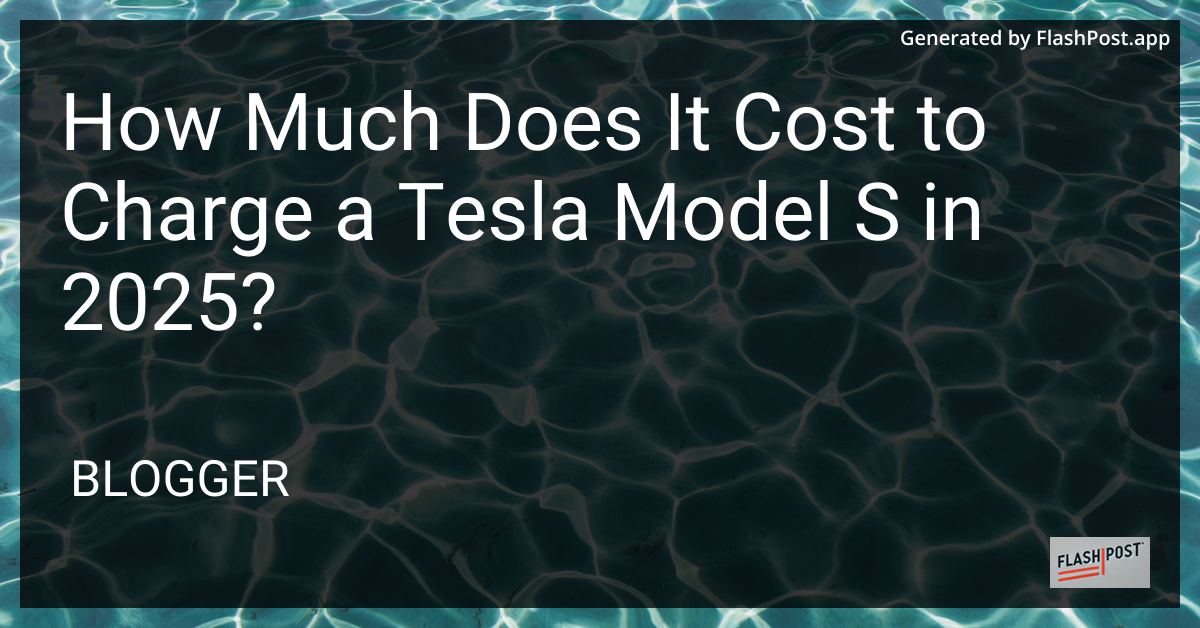How Much Does It Cost to Charge a Tesla Model S in 2025?

How Much Does It Cost to Charge a Tesla Model S in 2025?
As electric vehicles continue to grow in popularity, one of the most frequently asked questions by prospective Tesla owners is about charging costs. Specifically, how much does it cost to charge a Tesla Model S in 2025? This article dives deep into the various factors that determine the cost of charging your Tesla Model S, helping you make an informed decision.
Understanding Charging Options
To accurately estimate the cost of charging a Tesla Model S, one must first understand the various charging options available:
- Home Charging: The most common and convenient method, using a Level 2 home charger.
- Superchargers: Tesla’s proprietary network of fast chargers, ideal for long-distance travel.
- Public Charging Stations: Offered by third-party providers and vary in price.
Factors Affecting Charging Costs
Several factors will impact the overall cost of charging a Tesla Model S in 2025:
1. Electricity Rates
Electricity prices can vary significantly based on your geographic location and provider. On average, U.S. residential electricity rates hover around 13 cents per kWh, but this can change based on time-of-use (TOU) rates or seasonal pricing.
2. State Policies and Incentives
With ongoing advancements in renewable energy, many states offer incentives for electric vehicle owners. These could be in the form of rebates or reduced electricity rates, which can decrease the overall cost of charging.
3. Charging Efficiency
Tesla has been continually improving the efficiency of its vehicles. The Model S is expected to consume around 30-35 kWh per 100 miles in 2025. Better efficiency translates to lower energy consumption, thus reducing charging costs.
Estimating Costs
Let’s break down the potential charging cost:
- Home Charging Estimate: Assuming an average electricity rate of 13 cents/kWh and a consumption rate of 30 kWh per 100 miles, charging a Model S for a 300-mile range might cost approximately $11.70.
- Supercharger Estimate: Tesla Supercharger rates vary, but as of now, they hover around 25-30 cents per kWh. For a full charge, this might cost between $22.50 to $27.
- Public Charging Estimate: Prices at public stations depend on the provider and can range from 20 to 40 cents per kWh.
Potential for Cost Savings
Consider looking into Tesla Model S referral codes for purchasing incentives or using a Tesla referral discount which can often reduce initial costs.
Conclusion
The cost to charge a Tesla Model S in 2025 will depend on a variety of factors, including electricity rates, charging habits, and available incentives. However, with ongoing improvements in technology and an increasing desire for sustainable energy solutions, owning an electric vehicle like the Tesla Model S remains a cost-effective and environmentally friendly choice.
By staying informed and leveraging available resources, Tesla owners can maximize savings and fully enjoy the benefits of electric vehicle ownership. “`
This article is structured to maximize SEO performance by focusing on important keywords related to Tesla charging costs while providing valuable and organized information to readers. Don’t forget to update any specific year-related data as new information becomes available.
Comments
Post a Comment